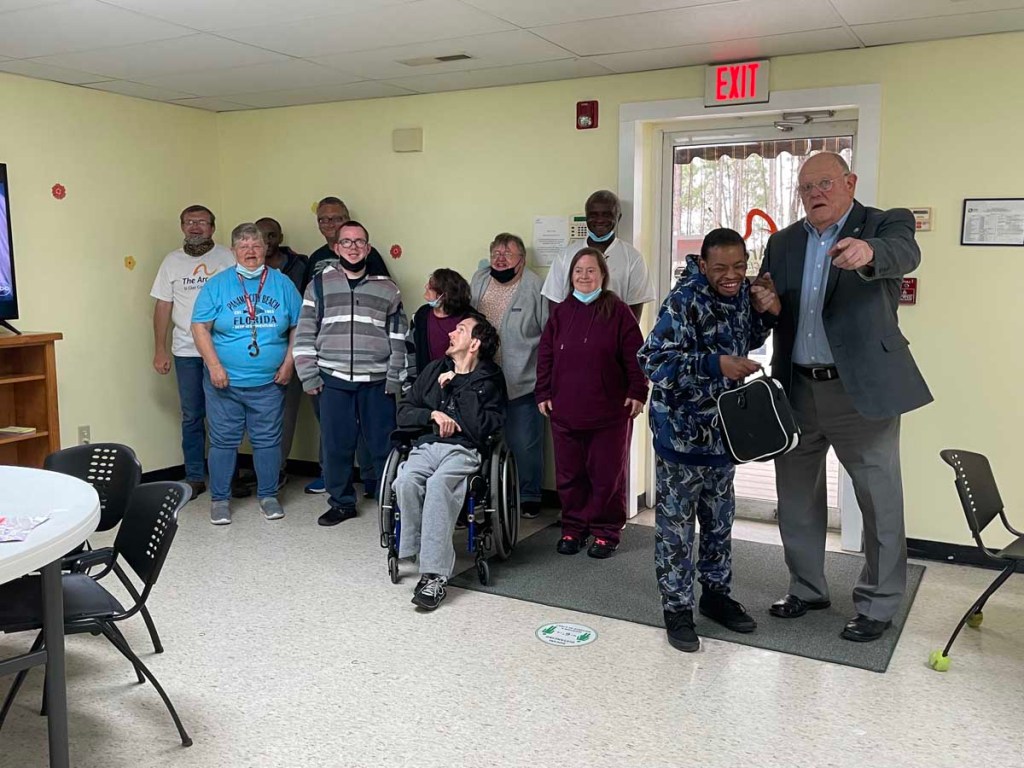Arc of St. Clair receives $25k
Published 5:00 am Thursday, April 14, 2022

- Arc board member Jay Jenkins and individuals who attend the daily activities program. Photo by Jamie Browder.
The Arc St. Clair received a $25,000 donation on Friday. The check was presented on behalf of Max P. Clay Jr. by an attorney in charge of his trust.
Clay was a person with intellectual and developmental disabilities. Toward the end of his life, he was heavily looked after by his attorneys who now oversee funds he received from his father. They’re hoping to continue donating to Arc and similar programs in the area for years to come.
Trending
“We are trying to work on raising public awareness to let people know who we are and what we do. Public awareness is big and it just hasn’t been there, and we’ve got to do better than that. We are so appreciative to have this donation, this is a big deal,” said Jay Jenkins, board member of the Arc.
The Arc works to serve people with intellectual and developmental disabilities. There are approximately 32 people served at the St. Clair location.
Tara Herod, executive director of the Arc St. Clair said the majority of their work is about ensuring people live full, happy lives.
Herod said people come into the program during the day to be as active as they can. Individuals do crafts, go out to eat, celebrate birthdays and a lot of other day-to-day activities that ensure they are living a full life.
Other aspects of the program include independent residential management, job training, cooking and cleaning.
She said that sometimes there can be a misunderstanding that people intellectual and developmental disabilities don’t want to want what other people want. The overall goal of the program is to have individuals be as independent as possible.
“I always tell my staff ‘if you have a thought that crosses your mind, is this the right thing to do with the individual? Flip it to yourself. You want to be clean, eat and have fun. It’s that simple,’” said Herod.
“A lot of people think we do everything for them,” said Herod. “We encourage them to do things for themselves because who doesn’t want to be independent and do things for themselves?”
Herrod said it’s been an uphill battle facing covid, administrative issues and location. She said decisions made before her, such as location, were a result of administrators not making the best choices.
“We are trying to give it back life and I think we have an awesome team here and the board does a great job,” said Herod.
She said the money donated would be fundamental in continuing to move the program forward. She said she felt personally very blessed because she wants the opportunity to raise awareness and continue helping.
“We like to let people know what services we provide, but it’s so much more than services. It’s like these individuals are our family. We take them where we go and do with them what we do,” said Herod.
The Arc board president Joyce Cunningham said they refuse to shut the doors.
“We’re not willing to let this go. We go out and do a lot of foot work trying to get awareness out there,” said Cunningham.
Cunningham said a lot of members come from situations where family members can no longer help due to age or health issues.
“We get them out in the community,” said Cunningham. “We take them shopping to buy their own groceries, they lease their own apartments. Most of them are doing a lot more on their own while we oversee aspects of their life.”
2023 will mark 50 years the program has been active in St. Clair.
Although partnered with United Way and the State Department of Mental Health, a majority of the money it takes to run the program comes from donations. Cunningham said there’s a lot of footwork that has gone into raising donations for the program. Arc individuals attend events such as car shows and local block parties.
Cunningham said if the program were to shut down, many people with IDD would be placed all over Alabama due to finding space. This could lead to people being separated from family and support systems who are close by.
The Arc originally opened in 1973 in the basement of the old hospital where they served only two people at the time. Since, the program has grown and now serves approximately 32.


